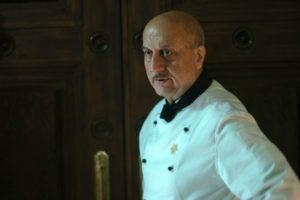Full of unexpected compassion and humanity, HOTEL MUMBAI is also a harrowing retelling of the 2008 takeover of the fabled Taj Hotel in Mumbai by terrorists whose zeal for religion had been twisted into something horrifying. The standard meet-and-greet of the people whose lives will shortly be forever changed is the only part of the film that comes close to be pedestrian, but even this necessary trope does an excellent job of explaining who these people are, and why we should care about them. By the end, tears of both happiness and sadness will be flowing, and not just from the eyes of the people on screen.

Nazanin Boniadi, Dev Patel, Armie Hammer
During that opening, director and co-writer Anthony Maras tracks three separate plot lines. The lowly hotel employee, Arjun (Dev Patel) who uses tweezers to make sure that the folds of his Sikh’s turban are precise. The rich couple Zahra and David (Nazanin Boniadi and Armie Hammer), whose arrival at the hotel sparks the attention to detail afforded every guest, including a rose-petal strewn bath at exactly 48 C, and the admonishment to staff to congratulate them on the baby they’ve just had, but not the wedding, which was less than nine months before the blessed event. The 10 terrorists making their way to Mumbai laden with the arsenal that will lay waste to more than the Taj, and whose small numbers will stymie the Mumbai police force over the course of a very long night.
Secondary characters, including the rich couple’s Aussie nanny (Tilda Cobham-Hervey); the disembodied voice of

Anupam Kher
The Bull speaking to the terrorists on their earbuds; a shady, cold-eyed Russian (Jason Isaacs) with no sense of decorum as he chooses his after-dinner entertainment from the stack of photos of comely, high-priced call girls spread out over the tablecloth; and the head chef (Anupam Kher in a superb, multi-layered performance) who berates Arjun for his inappropriate footwear before attempting to send him home, will all play essential parts as they drive the action, intentionally or not.
The violence is devastating. Not just the actual footage from Indian television that is far more graphic than what would be shown here, but also the way that the terrorists dispatch their victims. It is swift and it is mechanical, with no more emotion than, as one character puts is, killing a rabbit. These young men doing what they consider God’s work have a far more emotional response to the first-world plumbing and the catering cart food on which they snack between rounds from their automatic weapons. The camera watches with almost the same dispassionate remove, as bullets from handguns are shot into the heads of people who cannot flee, and hails of bullets cut down anyone unwise enough to run for it.
As the situation deteriorates, with the closest tactical squad making its hours-long trip from New Delhi, the guests and the staff who elect to stay to help them, are forced into ever more impossible choices, and our young rich couple, separated from their baby, and eventually each other, becoming more frantic as they come to realize that the baby’s cries, wherever it is, could lead the terrorists right to him. The tension of silence and waiting is unbearable, as each character’s flaws and heroism comes to the fore. Cell phone conversations are as heartbreaking as cell phones that aren’t answered, and the power of kindness when it is least deserved is overwhelming.
An especially welcome touch is that, unlike so many films set outside of Europe or America, it is not the lone white guy involved who is tasked by script and convention to save the day. Instead it is that staff who willingly takes on the responsibility for their guests, not as an act of subservience, but one of price and of humanity, fully cognizant of what their decision to stay, when escape had at one point been an option, means. Including the fact that they are the sole support of their families who live in so much less than the splendor of the Taj. Ditto having the four Mumbai policemen who decide to try stopping the terrorists before the tactical squad arrives. They don’t speak English to each other, defying another convention. This is their story, not ours, and they should be the ones to tell it.
Your Thoughts?